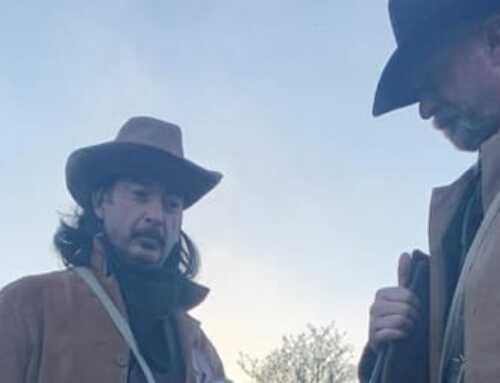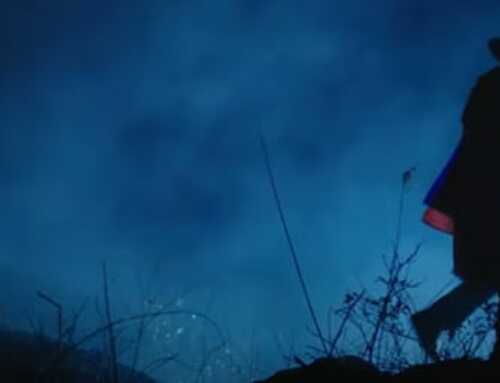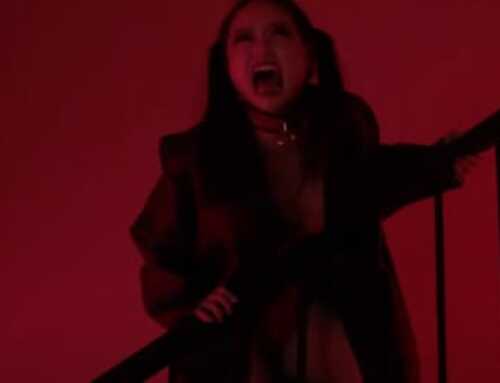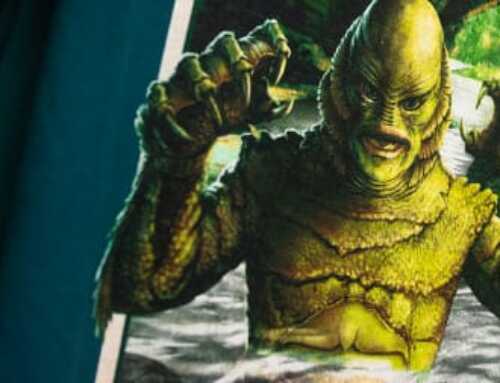You thought the zombie genre was dead. I did too actually. With their new burst of life that began in the late 90’s beginning to fade, it seemed as if we had finally seen every possible iteration of the undead. Then director Jeff Barnaby rolled up with his brilliant film BLOOD QUANTUM. Directed and written by, Barnaby (Rhymes for Young Ghouls). The horror film stars Michael Greyeyes (“Fear the Walking Dead”, True Detective), Forrest Goodluck (The Revenant), Kiowa Gordon (Twilight franchise), and Elle-Máijá Tailfeathers (The Body Remembers When the World Broke Open) The indigenous people in the isolated reserve of Red Crow are immune to the zombie plague that takes over the nation, but that doesn’t mean their lives aren’t at risk. It’s up to Traylor (Michael Greyeyes, “Fear the Walking Dead”), the tribal sheriff, to protect the families residing on the reserve and a flood of desperate refugees from the hordes of bloodthirsty, walking white corpses that are closing in.
We had the privilege of speaking with Barnaby by phone about his latest release and what it was like to unearth a new idea for such a well-worn subgenre of horror.
HorrorBuzz: Hi how are you sir?
Jeff Barnaby: I’m well thank you so much for taking this time and
HB: I actually really was surprised by this movie because it was an original zombie film. That kind of blew me away. Very nice work. I think it took a lot of people by surprise.
JB: It did. They didn’t realize that there were any original zombie films.
HB: But how? How, as as the writer, how did you connect this idea? Where did the inspiration for this come from?
JB: I wanted to read the colonization story in a reasonable way, while at the same time maintaining entertainment value. It was kind of a moment while we were talking about what to do next. It was like I wanted to do is on the right way right where it started as a comedy zombie movie because I love the genre. From that point, reverse engineering, how do we make these zombies original again, and not played to a saturated market? So I came to this idea of making the natives immune to the zombie plague which is basically, the whole idea of colonization. You’re talking about a populace that came into the indigenous culture that these diseases that were being carried. So, in my story, it’s the exact opposite. It was just like, we had this eureka moment.
The next year we were pitching
HB: Yeah, and I mean it was utterly brilliant because of exactly that. No disrespect But it was just such an obvious move. You know, it just makes so much sense.
JB: I’ve been hearing a lot today
HB: How did Native American lore and legend inform how you constructed the zombie mythos for this universe?
JB: To be honest, I mean, I grew up Mi’kmaq, so I didn’t really think about it. Like, how can I inject my culture into this, it was more inherent, these are the characters I was going to put in there. I was really trying to inform the audience about what it was to be Mi’kmaq. So I think It was just a matter of presenting these characters, as I knew them, not so much as metaphors or trying to represent anything in particular. It was from my own experience.
HB: Another thing that really impressed me was and kind of where I was how the earth basically just turned on on its own invaders you know, so much so that you even included the animals in the in kind of the reanimation.
JB: As a species are living past our means we just passed what is called the date where we run out of resources for the planet. So that’s already gone by. Scientists worth a damn are saying that this lifestyle is unsustainable and will eventually collapse. Much like, scientists were saying that there’s another pandemic coming. It seems like everybody’s ignoring that them still. Basing our entire culture on fossil fuels, and once that resource runs out, the supply chain is going to fall. And, you know, I think we’re actually going to see this in our lifetime to see some version of capitalism that we see right now, the reason capitalism carries successfully into the future, so we’re going to need to change and much like what the virus is doing now. It’s going to be a kind of forced attrition. It’s not something that we’re going to use it seems like because we all seem to collectively stupid to make that decision for ourselves. Well,
HB: It’s not a cheery prospect, but nobody seems to be doing anything about it. How did you go about casting the film? Were you looking at Native American and or Mi’kmaq, or?
JB: It’s always hard because you can always find young native actors, the most seasoned actors, the guys that have been around for a long time, though they’re hard to come by because eventually, as a native actor, you don’t find work. So people you know, in their 60s and 70s, were the hardest ones to cast. The old man had no experience whatsoever on-screen with speaking roles. He played background, and that’s it. So he was the hardest one to cast. Michael was easy because she’s such a fantastic personality and so easy to work with. So that made sense.
The challenge really is, is as a low budget filmmaker, you’re trying to basically navigate your budget, which isn’t always easy because you need to bring people in from everywhere. It’s not going to be like everybody’s just going to be in Montreal, and we didn’t find really anybody in Montreal with the exception of the fist pump every woman in Toronto, so we had to bring people in from everywhere.
HB: So speaking of your budget and special effects, the practical effects of this movie were just brilliant. They were wonderful. Were there any effects that you had to cut due to budget or you know, or did everybody just tend to make it work?
JB: We’ve had a very specific idea of how we were going to do the bridge scene with the snowplow, but we couldn’t do it because they just didn’t have the money for what I was thinking. And I think there was always going to be practical flexibility. I am lucky enough to work with the same effects guy for like 20 years now. So we knew what we were capable of. And, you know, writing the film up very, I was very aware of how we were going to do certain gags and how we were going to do certain things. And it was all just a matter of execution.
We’re going to sacrifice zombie for anything else is always going to be let’s put our best foot forward and work to make the slamming banger of a zombie film.
HB: Well, I gotta tell you, uh, I loved it. One of the best zombie movies I’ve seen in a long time. Please give us either a sequel or another movie filled with more Native American actors.
JB: We’re in the middle of it
HB: keep going because I want to see it.






